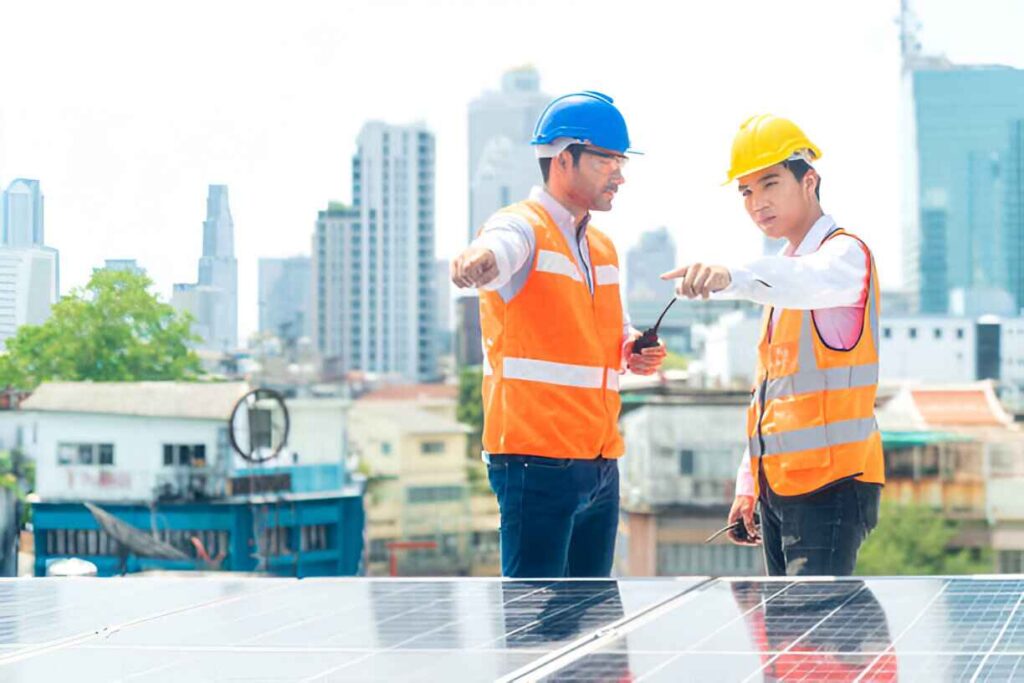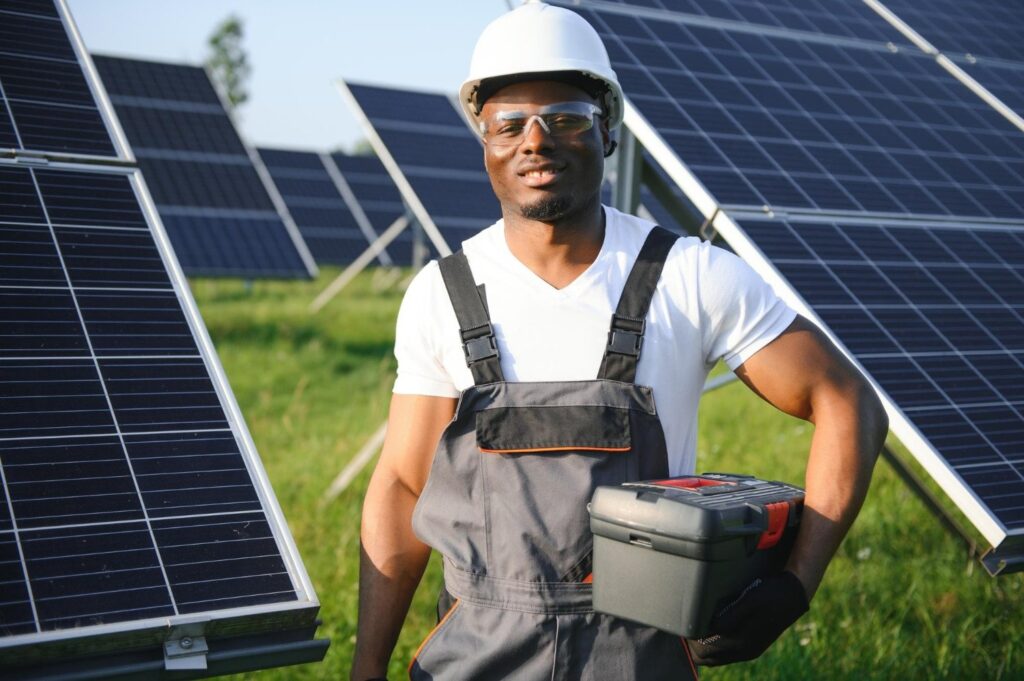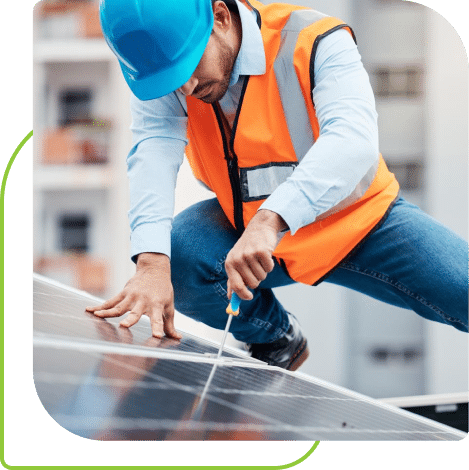Training for Solar Panel Installation in Ghana: Empower Your Future
Training for solar panel installation in Ghana is increasingly accessible, offering various programs for skill development. These educational opportunities cater to the growing renewable energy sector.
Solar energy is transforming the power landscape in Ghana, making the acquisition of technical expertise in solar panel installation a valuable asset for professionals. As the country harnesses its abundant sunshine, the demand for skilled installers is on the rise.
Individuals seeking to join this green revolution can find numerous training courses, ranging from vocational schools to specialized workshops. These programs are designed to equip participants with the knowledge and hands-on experience needed to install, maintain, and repair solar photovoltaic systems. With an emphasis on sustainability and economic growth, these training opportunities provide a pathway to not only personal advancement but also contribute to the nation’s energy independence.

The Solar Energy Landscape In Ghana
The sun beats down on Ghana, offering endless energy possibilities. Solar power shines as a beacon of hope for sustainable development. Ghana’s solar industry is on a bright path, with demand for clean energy on the rise. Let’s explore this radiant landscape.
Rising Demand For Renewable Energy
Ghana’s appetite for energy grows daily. Traditional sources strain to keep up. People now look to the sun for answers. Solar panels dot rooftops across the nation. Businesses and homes alike seek this green power. The future is sunny for Ghana’s energy needs.
Why Solar Panel Installation Skills Are Vital
Solar panel installation skills are now crucial in Ghana. These skills help grow jobs and keep our planet clean. Let’s explore why learning to install solar panels matters so much.
Job Market And Economic Growth
Ghana’s economy gets a big boost from solar energy. More solar panels mean more jobs. Here’s how:
- New jobs: Companies hire more people to install and maintain solar panels.
- Skills development: Workers learn new, valuable skills.
- Local businesses grow: Shops that sell solar products get more customers.
This growth helps everyone in Ghana make more money and live better.
Environmental Impact And Sustainability
Using solar panels helps our planet. Here’s why:
- Clean energy: Solar panels make power without dirty smoke.
- Less global warming: They help stop the earth from getting too hot.
- Safe for all: Solar energy is safe for people and animals.
This way, Ghana stays beautiful and healthy for everyone.

Basic Requirements For Aspiring Solar Technicians
Embarking on a solar technician career in Ghana demands specific prerequisites. These ensure readiness for the industry’s physical and intellectual challenges. This section highlights the fundamental requirements for those interested in solar panel installation training.
Educational Background
Education forms the backbone of a solar technician’s expertise. Candidates should possess a minimum of:
- High school diploma or equivalent
- Maths and science proficiency for technical understanding
- Basic electrical knowledge is a plus
Further education in renewable energy or electrical engineering can set candidates apart.
Physical And Technical Aptitudes
Solar technicians need a blend of physical and technical skills. These include:
| Physical Skills | Technical Skills |
| Good balance and coordination | Understanding of power tools |
| Strength to lift heavy panels | Ability to read blueprints |
| Comfort with heights | Problem-solving abilities |
Stamina and dexterity are crucial as jobs often occur outdoors in various weather conditions.
Finding The Right Training Program
Embarking on a career in solar panel installation is an exciting journey. The right training program equips you with the necessary skills. It also ensures success in Ghana’s solar industry. Let’s explore accredited institutions and key program features.
Accredited Institutions In Ghana
Accreditation is crucial for any training program. It signifies quality and recognition. In Ghana, several institutions offer accredited solar panel installation courses. These include:
- Kumasi Technical University
- Accra Institute of Technology
- Renewable Energy Technology Training Institute
These institutions meet national education standards. They provide recognized certifications upon course completion.
Key Features Of Quality Programs
A quality training program is comprehensive. It covers theory and practical applications. Look for these features:
- Curriculum aligned with industry standards
- Hands-on training with modern solar technology
- Qualified instructors with field experience
- Support for job placement after graduation
These features ensure trainees are job-ready. They can confidently install, maintain, and troubleshoot solar systems.
Curriculum And Skills Covered In Training
Training for Solar Panel Installation in Ghana focuses on essential curriculum and skills. This training prepares individuals for a bright career in solar energy. Let’s explore the core areas of this training.
Technical Knowledge And Practical Skills
The foundation of solar panel installation training is technical knowledge and practical skills. Trainees learn about:
- Solar energy principles – How solar power works.
- Types of solar panels – Their uses and differences.
- System design – Planning efficient solar setups.
- Electrical basics – Understanding wiring and connections.
- Installation techniques – Best practices for mounting panels.
Hands-on training ensures skills are practised and perfected.
Safety Protocols And Certifications
Safety is crucial in solar panel installation. The training covers:
- Personal protective equipment (PPE) – Proper use and importance.
- Electrical safety – Preventing shocks and accidents.
- Working at heights – Safe practices for rooftop work.
- Fire safety – Mitigating risks during installation.
Trainees also prepare for certifications. These validate their skills and knowledge. Certifications make them stand out to employers.
Hands-on Experience: The Core Of Learning
Mastering solar panel installation in Ghana requires more than just classroom theory. It demands hands-on experience, where skills are honed in real-life scenarios. Training programs must blend knowledge with action. Students gain confidence and competence through practical work.
Internships And Apprenticeships
Internships and apprenticeships are vital for aspiring solar technicians. They offer in-depth exposure to the solar industry.
- Trainees work with seasoned professionals.
- They learn installation nuances firsthand.
- These programs bridge the gap between theory and practice.
Participants in these programs experience diverse installation scenarios. They get feedback from experts in the field. This builds their skill set effectively.
Real-world Project Involvement
Engaging in real-world projects is essential. Trainees tackle actual solar panel installations. They learn by doing, which is crucial.
- Trainees assess different site conditions.
- They plan and execute installation projects.
- Trainees troubleshoot issues on the spot.
This involvement cements their understanding. It prepares them for future challenges in their careers.
Navigating The Job Market Post-training
After completing training in solar panel installation, stepping into the job market can be daunting. Yet, with the right approach, opportunities unfold. Skills in renewable energy are in high demand, especially in Ghana where solar potential is vast. Graduates must harness their new abilities to secure a bright career future.
Building A Professional Network
Networking is crucial in the solar industry. Begin by connecting with trainers and classmates. Attend renewable energy events and join online forums. Share your journey and learn from others. These steps can open doors to job leads and valuable advice.
- Connect with industry professionals.
- Join renewable energy groups on social media.
- Attend workshops and seminars regularly.
Career Paths And Progression
Career growth in solar energy is promising. Start as an installer or technician. With experience, you could become a project manager or a consultant. Some pursue entrepreneurship, starting their own solar businesses. Explore these paths and set clear career goals.
| Position | Experience Required | Potential Next Step |
| Installer | Entry-level | Technician |
| Technician | 2+ years | Project Manager |
| Project Manager | 5+ years | Consultant |
| Consultant | Varies | Entrepreneur |
Ongoing Education And Keeping Skills Current
The solar energy sector in Ghana is growing rapidly. Skilled installers are in high demand. Keeping up with the latest knowledge is key. Let’s explore how ongoing education can keep solar panel installation skills sharp.
Advanced Training Opportunities
Advancements in solar technology happen fast. Installers need to stay ahead. Advanced training programs offer this edge. They cover new installation techniques and emerging technologies. These programs often lead to certifications. Certifications prove expertise to clients and employers.
- Hands-on workshops – These enhance practical skills.
- Online courses – They offer flexibility for busy schedules.
- Certification programs – These validate skill levels.

Staying Updated With Industry Trends
The solar industry evolves constantly. Installers must keep up with these changes. Staying informed about industry trends is crucial. It ensures the delivery of efficient and modern solar solutions.
- Read industry publications regularly.
- Attend solar energy conferences.
- Engage with professional networks.
By engaging in these activities, installers maintain a competitive edge. They deliver the best service possible. Both their knowledge and their careers grow.
Success Stories: Transforming Lives Through Solar Education
Solar energy is changing lives in Ghana. Training for solar panel installation is at the core of this transformation. People from various backgrounds are now equipped with the skills to harness the power of the sun. These success stories highlight the remarkable impact of solar education.
Testimonials From Trained Professionals
- Ama, a recent graduate, says, “The skills I gained have secured me a job that helps my community get clean energy.“
- Kwame, an electrician, shares, “Learning about solar installation has doubled my income and client base.“
- Adjoa, an entrepreneur, states, “This training has empowered me to start my own solar business.“
Case Studies Of Successful Solar Projects
| Project | Location | Impact |
| Solar School | Kumasi | Provided power to 500 students |
| Health Clinic | Tamale | Enabled 24/7 healthcare services |
| Community Center | Accra | Reduced energy costs by 75% |
Investing In The Future: The Role Of Stakeholders
Training for solar panel installation in Ghana is a big step forward. It’s about investing in the future. Many people have roles in this journey. Let’s explore the role of stakeholders.
Community Engagement And Support
Local communities play a big role too. They host training centres. They also support trainees. This support is crucial for success.
- Communities host workshops.
- They encourage their members to learn.
- Success stories inspire more people to join.
Community support helps spread the word. It makes training more effective. It ensures everyone benefits from solar energy.
Frequently Asked Questions
What Qualifications Are Needed For Solar Installation?
To become a solar panel installer in Ghana, individuals typically require a high school diploma followed by vocational training in solar panel installation. Some may opt for certification through recognized institutions to enhance their credentials.
How Long Does Solar Training Take In Ghana?
Solar panel installation training in Ghana varies by program but generally spans a few weeks to several months. Intensive courses may offer quicker, yet comprehensive, skill acquisition for immediate entry into the field.
What Is The Cost Of Solar Panel Training?
The cost of solar panel installation training in Ghana can range widely, often between a few hundred to several thousand Ghanaian cedis, depending on the institution and the depth of the training provided.
Are There Online Solar Installation Courses Available?
Yes, there are online courses available for solar panel installation training. These offer flexible learning options for individuals in Ghana who may not be able to attend in-person classes.
Conclusion
Embarking on a solar panel installation training program in Ghana offers a bright future in green energy. This journey equips participants with essential skills for a sustainable career. With the growing demand for renewable energy solutions, such training is a wise investment.
Don’t miss the opportunity to power not only homes but also your professional growth in this exciting field.
